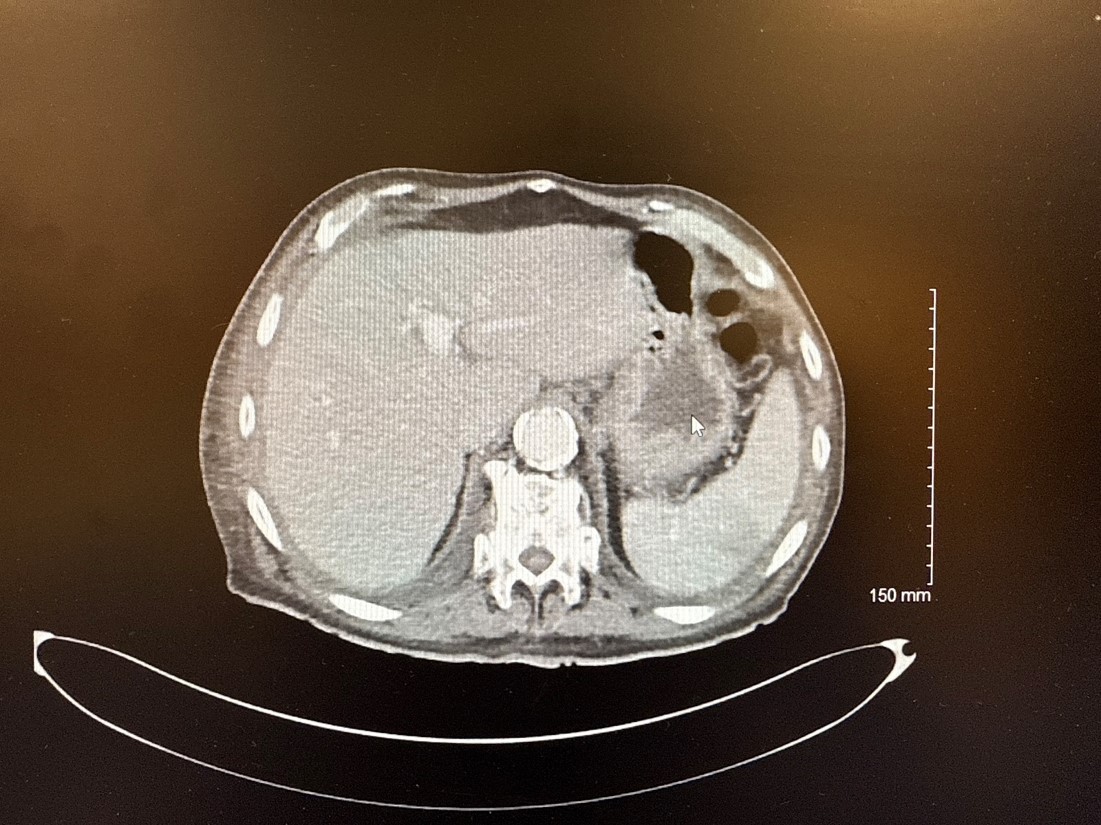Tuesday Poster Session
Category: Infections and Microbiome
Beyond the Gut: <i>C. diff</i> Bacteremia in an Elderly Patient
P5608 - Beyond the Gut: C. diff Bacteremia in an Elderly Patient
Tuesday, October 28, 2025
10:30 AM - 4:00 PM PDT
Location: Exhibit Hall
- RK
Raaghvi Kohli, MD (she/her/hers)
Conemaugh Memorial Medical Centre
Johnstown, PA
Presenting Author(s)
Raaghvi Kohli, MD, Muhammad Zaman, MD, Hatice Kurt, MD, Warsha Korani, MD
Conemaugh Memorial Medical Centre, Johnstown, PA
Introduction: Clostridium difficile infection (CDI) is a common community-acquired and nosocomial infection that usually presents as colitis. Clostridium difficile bacteremia is an exceedingly rare blood infection, with only a few cases documented in literature. This case illustrates an unusual presentation of CDB in an elderly male with complex abdominal pathology & polymicrobial infection.
Case Description/
Methods: An 82-year-old male who presented to hospital with fevers and chills, new onset right upper quadrant abdominal pain, and respiratory distress. He was recently discharged from the hospital for an unresectable cecal mass for which he had undergone Robotic-assisted laparoscopic right hemicolectomy, extracorporeal side-to-side stapled ileocolonic anastomosis, and lysis of adhesions a month ago.
Upon arrival he was hemodynamically unstable with electrolyte derangements. EKG was significant for rapid atrial fibrillation. Imaging was significant for a large peripherally enhancing collection with air colliculi in the right abdomen, concerning for an abscess and patient was started on piperacillin tazobactam. Patient was also started on rectal vancomycin for c diff colitis which was later transitioned to oral fidaxomicin when the blood cultures became positive for c difficile.
The abdominal abscess was drained revealing polymicrobial flora including Enterococcus faecium, E. coli, Proteus species, Klebsiella pneumonia, and Staph epidermidis after which patient was transitioned to linezolid to receive a total of two weeks of antibiotics.
Discussion: The case highlights the clinical complexity and rarity of clostridium difficile bacteremia. While CDI is a well recognized cause of nosocomial diarrhea, its presence in the bloodstream is unusual and potentially life threatening. Clostridium difficile bacteremia is a rare clinical entity, accounting for less than 0.2% of all C. difficile infections and occurring at a rate of only a few cases per 100,000 hospital admissions.
Antimicrobial drug therapy for bacteremia and other extracolonic C. difficile infections varies greatly in the literature. There are significant gaps in the evidence base for C. difficile bacteremia, as no clinical trials or direct studies exist; all recommendations are based on expert opinion and extrapolation from severe CDI guidelines. Management should be individualized, and multidisciplinary involvement is strongly advised.

Figure: Abdominal abscess on imaging
Disclosures:
Raaghvi Kohli indicated no relevant financial relationships.
Muhammad Zaman indicated no relevant financial relationships.
Hatice Kurt indicated no relevant financial relationships.
Warsha Korani indicated no relevant financial relationships.
Raaghvi Kohli, MD, Muhammad Zaman, MD, Hatice Kurt, MD, Warsha Korani, MD. P5608 - Beyond the Gut: <i>C. diff</i> Bacteremia in an Elderly Patient, ACG 2025 Annual Scientific Meeting Abstracts. Phoenix, AZ: American College of Gastroenterology.
Conemaugh Memorial Medical Centre, Johnstown, PA
Introduction: Clostridium difficile infection (CDI) is a common community-acquired and nosocomial infection that usually presents as colitis. Clostridium difficile bacteremia is an exceedingly rare blood infection, with only a few cases documented in literature. This case illustrates an unusual presentation of CDB in an elderly male with complex abdominal pathology & polymicrobial infection.
Case Description/
Methods: An 82-year-old male who presented to hospital with fevers and chills, new onset right upper quadrant abdominal pain, and respiratory distress. He was recently discharged from the hospital for an unresectable cecal mass for which he had undergone Robotic-assisted laparoscopic right hemicolectomy, extracorporeal side-to-side stapled ileocolonic anastomosis, and lysis of adhesions a month ago.
Upon arrival he was hemodynamically unstable with electrolyte derangements. EKG was significant for rapid atrial fibrillation. Imaging was significant for a large peripherally enhancing collection with air colliculi in the right abdomen, concerning for an abscess and patient was started on piperacillin tazobactam. Patient was also started on rectal vancomycin for c diff colitis which was later transitioned to oral fidaxomicin when the blood cultures became positive for c difficile.
The abdominal abscess was drained revealing polymicrobial flora including Enterococcus faecium, E. coli, Proteus species, Klebsiella pneumonia, and Staph epidermidis after which patient was transitioned to linezolid to receive a total of two weeks of antibiotics.
Discussion: The case highlights the clinical complexity and rarity of clostridium difficile bacteremia. While CDI is a well recognized cause of nosocomial diarrhea, its presence in the bloodstream is unusual and potentially life threatening. Clostridium difficile bacteremia is a rare clinical entity, accounting for less than 0.2% of all C. difficile infections and occurring at a rate of only a few cases per 100,000 hospital admissions.
Antimicrobial drug therapy for bacteremia and other extracolonic C. difficile infections varies greatly in the literature. There are significant gaps in the evidence base for C. difficile bacteremia, as no clinical trials or direct studies exist; all recommendations are based on expert opinion and extrapolation from severe CDI guidelines. Management should be individualized, and multidisciplinary involvement is strongly advised.

Figure: Abdominal abscess on imaging
Disclosures:
Raaghvi Kohli indicated no relevant financial relationships.
Muhammad Zaman indicated no relevant financial relationships.
Hatice Kurt indicated no relevant financial relationships.
Warsha Korani indicated no relevant financial relationships.
Raaghvi Kohli, MD, Muhammad Zaman, MD, Hatice Kurt, MD, Warsha Korani, MD. P5608 - Beyond the Gut: <i>C. diff</i> Bacteremia in an Elderly Patient, ACG 2025 Annual Scientific Meeting Abstracts. Phoenix, AZ: American College of Gastroenterology.
